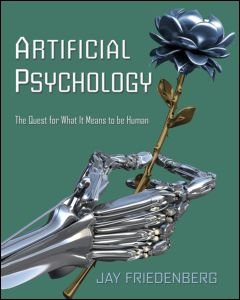

Most ebook files are in PDF format, so you can easily read them using various software such as Foxit Reader or directly on the Google Chrome browser.
Some ebook files are released by publishers in other formats such as .awz, .mobi, .epub, .fb2, etc. You may need to install specific software to read these formats on mobile/PC, such as Calibre.
Please read the tutorial at this link: https://ebookbell.com/faq
We offer FREE conversion to the popular formats you request; however, this may take some time. Therefore, right after payment, please email us, and we will try to provide the service as quickly as possible.
For some exceptional file formats or broken links (if any), please refrain from opening any disputes. Instead, email us first, and we will try to assist within a maximum of 6 hours.
EbookBell Team

0.0
0 reviews
ISBN 13: 9781136873843
Author: Jay Friedenberg
Is it possible to construct an artificial person? Researchers in the field of artificial intelligence have for decades been developing computer programs that emulate human intelligence. This book goes beyond intelligence and describes how close we are to recreating many of the other capacities that make us human. These abilities include learning, creativity, consciousness, and emotion.
The attempt to understand and engineer these abilities constitutes the new interdisciplinary field of artificial psychology, which is characterized by contributions from philosophy, cognitive psychology, neuroscience, computer science, and robotics. This work is intended for use as a main or supplementary introductory textbook for a course in cognitive psychology, cognitive science, artificial intelligence, or the philosophy of mind. It examines human abilities as operating requirements that an artificial person must have and analyzes them from a multidisciplinary approach.
The book is comprehensive in scope, covering traditional topics like perception, memory, and problem solving. However, it also describes recent advances in the study of free will, ethical behavior, affective architectures, social robots, and hybrid human-machine societies.
1. Introduction
The Amazing Human
What Does It Mean to Be Human?
Varieties of Man-Machine
The Artificial Person in Mythology and Literature
Theology and Artificial People
Early Attempts at Constructing an Artificial Person
The Natural and the Artificial
Understanding: What It’s Like to Really Know Something
Reproduction: Maybe More Than Just a Copy
Objections and Counterarguments
The Incompleteness Objection
The Complexity Objection
The Quantum Indeterminacy Objection
The Engineering Limitation Objection
2. Brain and Mind
The Brain: Where It All Starts
The Mind: What the Brain Does
What Are Minds For?
A History of Early Computers
Computers and Information Processing
Brains and Computers: Are They the Same?
Representation and Computation
Processing Style
Speed and Accuracy
Tasks and Strategy
World Knowledge
Building an Artificial Brain
The Serial Digital Computer
Parallel Distributed Processing
Artificial Neural Networks
Parallel Computing
Multi-Computer Systems
Distributed Artificial Intelligence
Can We Build It?
The Brain Perspective
The Computer Perspective
Fringe Consciousness
Ambiguity Tolerance
Essential/Inessential Discrimination
Perspicuous Grouping
3. Perception and Action
Perceptual Mechanisms
Human and Computer Vision
Artificial Eyes
Artificial Ears
Artificial Noses and Tongues
Artificial Skin
Motor Mechanisms
Artificial Muscles
Artificial Arms
Artificial Hands
Artificial Legs
Neural Prosthetics
Perception and Action
Robotics
Robotic Paradigms
Active Vision
Obstacle Avoidance and Navigation
Reaching
Grasping and Manipulation
Walking and Running
4. Learning and Memory
Learning
Behavior-Based Learning
Classical Conditioning
Operant Conditioning
Observational Learning
Knowledge-Based Learning
Supervised Learning
Inference
The CYC Project
Analogical and Case-Based Reasoning
Memory
Memory and Time: The Long and Short of It
Human Short-Term Memory
Human Long-Term Memory
Computer Memory
Memory and Knowledge: Facts, Events, and Rules
Declarative Memory and Semantic Networks
Episodic Memory
Procedural Memory and Production Rules
Memory Processes
Nativism and Empiricism
5. Thinking
Thought
The Turing Test
Arguments and Counterarguments
Recent Criticisms
The Chinese Room
Evaluating the Chinese Room Argument
Learning in the Chinese Room
Simulation
Simulation and Realization
Simulation and Artificial Psychology
Meaning
Intentionality
The Symbol-Grounding Problem
Problems with Intentionality
Artificial Intentionality
Intentionality and Stances
Interpretation
The Syntax–Semantic Barrier and Computers
Thinking and Computing
6. Language
What Is Language?
Language Learning
Is Language Innate or Learned?
Human Language Acquisition
Agent Language Acquisition: The Talking Heads
Language and Neuroscience
Natural Language Processing
Stages of Natural Language Comprehension
Speech Recognition
Syntactic Analysis
Semantic Analysis
Pragmatic Analysis
Natural Language Production
Dialogue
Conversational Agents
7. Intelligence
What Is Intelligence?
One or Many Intelligences?
Intelligence Testing
Intelligent Agents
Agent Architectures
Environments
Micro-worlds and Scalability
Characteristics of Task Environments
Problem Solving and Search
Reasoning
Expert Systems
Planning
Brain-Based Intelligence
8. Creativity
What Is Creativity?
Aesthetic and Analytic Creativity
Knowledge and Skill
The Psychology of Creativity
Creative Personality Traits
Novelty Seeking and Arousal
Creativity Testing
The Six Steps of the Creative Process
Creativity and Computers
Creativity as an Evolutionary Process
Creativity as Rule-Governed Transformation
Creativity as Variation on a Theme
Creative Computer Programs
Computer Creativity in the Arts
Computer Creativity in the Sciences
Where Creative Computer Programs Fall Short
9. Free Will and Decision Making
Free Will and Determinism
The Anatomy and Physiology of Volition
The Conscious, the Subconscious, and Free Will
The Evolution of Free Will
an introduction to artificial psychology
artificial psychology the psychology of ai
artificial psychology definition
clayton lewis artificial psychology
artificial psychology book
Tags: Jay Friedenberg, Artificial, psychology